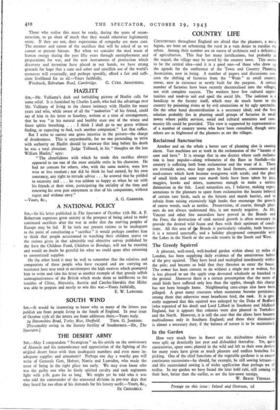COUNTRY LIFE
COUNTRYMEN throughout England are afraid that the planners, a noisy legion, are bent on urbanising the rural in a vain desire to ruralise the urban. Among their number are an excess of architects and a deficiency of agriculturists. This fear has many justifications, but probably in the sequel, the village may be saved by the country town. This seems to be the central idea—and it is a good one—of those who drew up the agenda for the conference of the Town and Country Planning Association, now in being. A number of papers and discussions con- cern the shifting of factories from the " Wens " to small country towns, now in existence or newly built for the purpose. A certain number of factories have been recently decentralised into the villages, not with complete success. The workers have few cultural oppor- tunities and tend.-to soil and spoil the social life. The isolation is a handicap to the factory itself, which may do much harm to the country by poisoning rivers or by evil emanations or by ugly spectacles. On the other hand decentralisation is a necessary ideal; and the best solution probably lies in planting small groups of factories in small towns where public services, social and cultural amenities and com- munity life could be provided. This view is supported by representatives of a number of country towns who have been consulted, though some others are as frightened of the planners as are the villages.
Reclaimed Sanctuaries Another and on the whole a better sort of planning also is causing alarm. Vast machines are at work in the reclamation of the " haunts of coot and hem." It is strange that in one district where such reclama- tion is least popular—along tributaries of the Bure in Norfolk—the country is suffering both from reclamation and the want of it. There are riverside acres, once kept open by local farmers, commoners and reed-cutters which have become overgrown with scrub; and the place of small birds and some rare marsh birds have been taken by jays, magpies, hawks and otters, numerous enough to make a serious diminution in the fish. Local naturalists are, I believer, making repre- sentations to the planners to spare from reclamation the haunts beloved of certain rare birds, such as the bittern and marsh harrier, and to refrain from raising excessively high banks that encourage the growth of coarse weeds, such as nettles. Preservation, of .course, though plan- ners do not always understand this, is not merely negative. As Mr. Vincent and other fine naturalists have proved in the Broads and the Fens, the destruction of rank natural growth is often necessary to provide the desired wild fauna and flora with their optimum of condi- tions. All this area of * Broads is particularly valuable, both because it is a natural sanctuafy, and a holiday playground comparable with the Lakes in the North or the sea-side resorts in the South and West.
The Greedy Squirrel A pleasant, well-treed, well-bushed garden within about 25 miles of London, has been supplying daily evidence of the omnivorous habits of the grey squirrel. They have bred and multiplied inordinately within the pale; and became . so bold that they threaten to enter the house. The owner has been content to do without a single nut or walnut, but is less pleased to see the apple crop devoured wholesale or knocked to the ground. Moreover there is a certain presumption that the nests of small birds have suffered only less than the apples, though this charge has not been brought home. Neighbouring corn-crops also have been pillaged. A great many creatures when numerous become pernicious, among them that otherwise most beneficent bird, the rook. It is gen- erally supposed that this squirrel was enlarged by the Duke of Bedford (who repented of his deed) and Lord Lilford in Southern and Midland England, but it appears that colonies were also planted in Yorkshire and the North. However, it is still the case that the aliens have become multiudinous only in Southern England; and there their diminution is almost a necessary duty, if the balance of nature is to be maintained.
In the Garden How very much finer in flower are the michaelmas daisies that were split up drastically last year and disbudded thereafter. Yet, quite contrariwise, spare roots planted in the wild and left to their own devices for many years have given as much pleasure and endless branches for picking. One of the chief functions of the vegetable gardener is to ensure continuous successions—he should, for example, be still sowing lettuces— and this successional sowing is of wider application than perhaps we all realise. In my garden we have found the later kohl rabi, still coming to their best, better than the earlier, as are the late-sown turnips.
W. BEACH THOMAS.
Postage on this issue : Inland and Overseas, id.


























 Previous page
Previous page